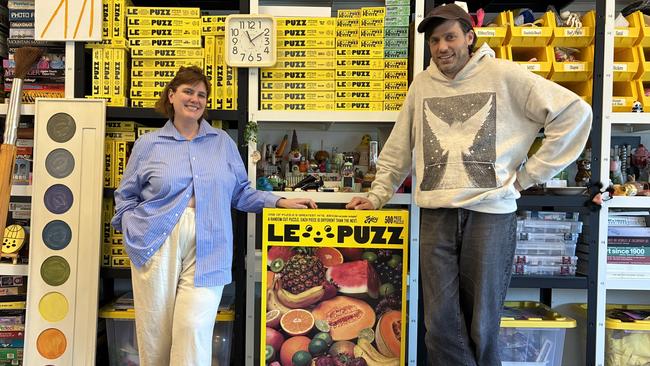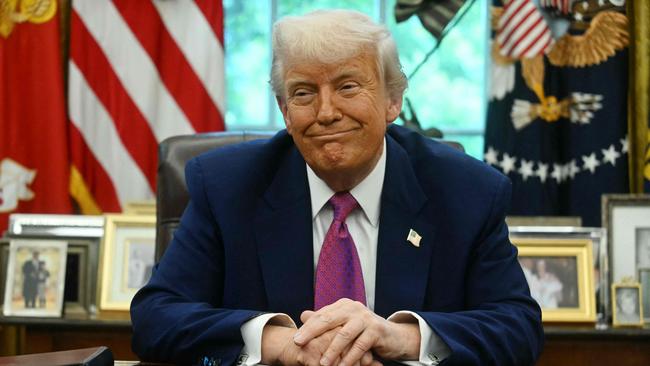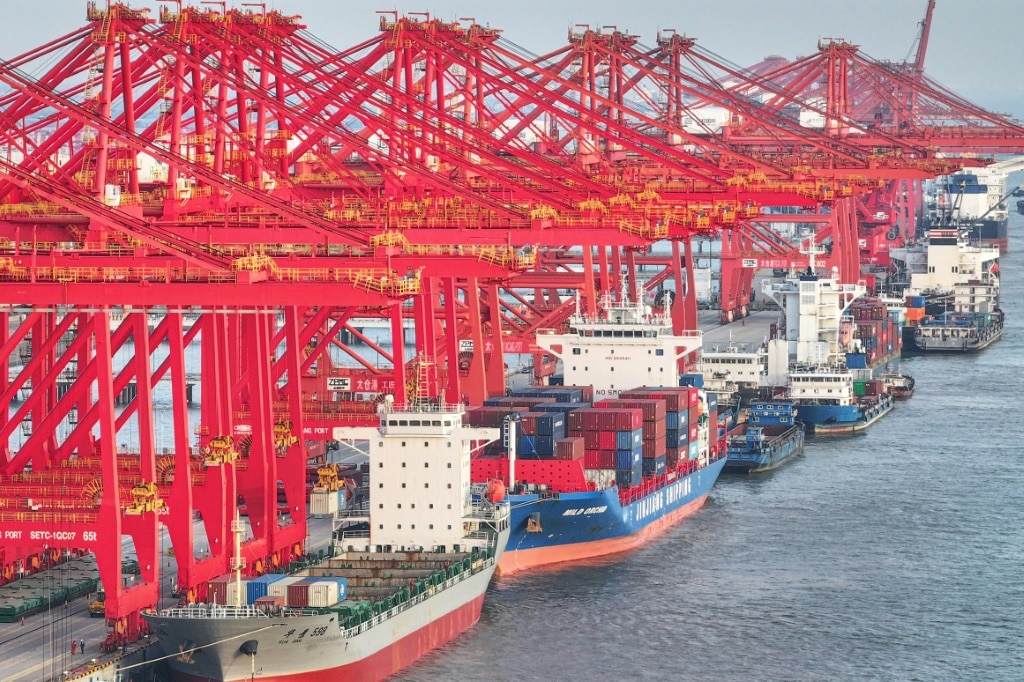American small businesses left to puzzle over Donald Trump’s tariff hits
A small puzzle maker in Brooklyn, New York, was nearly caught out by a $US141,000 ‘tariff tax’ as a result of Donald Trump’s trade war with Beijing but has no choice but to keep manufacturing in China.

Michael Hunter and Alistair Matthews run a successful puzzle business in Brooklyn, New York, that faces a huge gamble – whether to keep manufacturing their puzzles in China despite facing a potential $US141,000 ($219,000) “tariff tax” that it only narrowly avoided last month.
Le Puzz, set up during Covid, is a small business based in Brooklyn, New York, that is now emblematic of thousands of companies around the US struggling with the reality of Donald Trump’s “Liberation Day” tariffs and his trade war with China.
The duo, who launched their business in September 2021, feel they have no choice but to run the tariff gauntlet – a dilemma facing many entrepreneurs across the country. Like thousands of others, Le Puzz is stuck in limbo after the US and China agreed a 90-day pause on their tit-for-tat tariffs in which Mr Trump imposed 145 per cent tariffs on imports from China.
After the Trump administration moved to leave the tariffs at 30 per cent for 90 days earlier this month, Mr Hunter and Ms Matthews are now walking a financial tightrope to the future.
The pair, whose product sells in 13 countries including in Australia, say their product can’t be manufactured in the US without compromising on quality. For years they have felt secure in this knowledge – until now.
Puzzles were given an exemption from tariffs in Mr Trump’s first presidential term, so Mr Hunter and Ms Matthews placed their spring order in November 2024 believing their business model would hold up under a second Trump term.
But when their shipment arrived in March, the world had changed and the exemption had gone. The co-founders say their November order for 15,521 puzzles – produced at total cost of $US94,000 – attracted $US15,000 in tariffs and an extra $US1000 in processing fees.
“We did get hit with the 20 per cent (tariff) on our spring order,” said Mr Hunter. “Which was a $US16,000 extra bill.”
Ms Matthews said they decided to “eat those costs”. While the business copped the hit, it could have been far worse had the shipment been delayed by just a couple of weeks.
On April 9, the White House imposed a 145 per cent tariff on goods from China.
“We would have had to pay $US141,000 in just tariff tax,” Ms Matthews said. “Plus the $US94,000 for the merchandise. There’s literally nothing you can do about it.
“When we went to dinner – or lunch – with our manufacturers this past fall, November, we were like, ‘What’s going to happen with the tariffs?’ And they were like, ‘Oh, puzzles are exempt.’ So we didn’t even consider this was going to be a problem for us.”
Mr Hunter said an upfront cost of $US141,000 was enough to “easily tank a business”. He said the claim that US businesses did not pay the tariffs was also the “biggest misinformation campaign that’s been happening”.
“Le Puzz pays the tariff,” he said. “If there was a road that you can visualise, a road that we have to travel to get our goods made … that road did not have a toll on it.
“Now it has a toll. We now pay a ‘toll tax’ … It is charged when your product hits the port in the United States.”
A “tariff tax” of more than $US100,000 would require Le Puzz to “take out a big loan or raise our prices – double them essentially. Because a 145 per cent tariff tax more than doubles our manufacturing costs.”

Le Puzz sells its 500-piece puzzles for $US32 and its 1000-piece puzzles for $US38. But those prices will rise if the current 30 per cent tariff is not lowered.
Earlier this month Mr Trump reduced his 145 per cent tariff on Chinese goods to 30 per cent as part of a temporary 90-day pause.
But the outlook remains uncertain. Given that uncertainty, Le Puzz cancelled its mid-year restock. But it has decided to push ahead with a fresh shipment of puzzles from China for the northern autumn.
The plan initially was to have the puzzles manufactured in the US, but it was too difficult and expensive to manufacture the highly customised puzzles domestically.
Le Puzz was aiming for high-quality boxes and puzzle pieces that were coloured on both sides. It also wanted the pieces to be thicker than average as well as have a reusable bag for the puzzle itself.
Yet American manufacturers found these requirements difficult to meet and they were “maxed out” given the soaring demand for puzzles during the Covid pandemic.
“They said they wouldn’t be able to take our order for a year,” said Ms Matthews.
She noted the cost of actually cutting the puzzles in China was “a tenth of the price” when compared with the US.
The die cut – or “cookie cutter” – for a 1000-piece puzzle in China was only $US2000 and only $US1000 for a 500-piece puzzle.
“We went to our manufacturer, who we currently work with, and it was just like, open door, open door, open door,” said Mr Hunter. “Everything that we wanted on that list was achievable, plus extra. And we were like, ‘Wow, OK, this is so much easier, and it’s so much cheaper.’ ”
Manufacturing in China meant Le Puzz slashed production costs by one-third, even accounting for shipping costs.
“It really is a gamble,” Mr Hunter said.
“It doesn’t matter what the tariff is when we place the order. Again, when it hits that port is when it matters. So we’re just kind of crossing our fingers that by September, you know, October, it’s going to be lower than 30 (per cent) or hold.”
The Le Puzz co-founders were inspired by the vintage puzzles from the 1960s, 70s and 80s and called on design studio Little Troop – based between Melbourne and Brooklyn – to help craft the striking yellow and black appearance of their puzzle boxes.
They have now established about 400 relationships with independent retailers and their puzzles are sold in 13 countries, including in Australia.







To join the conversation, please log in. Don't have an account? Register
Join the conversation, you are commenting as Logout